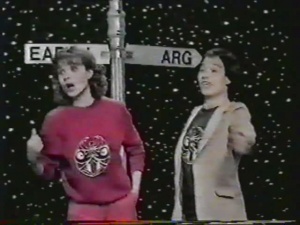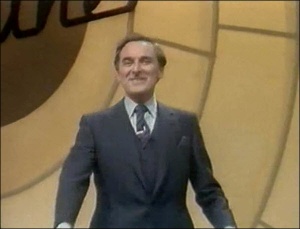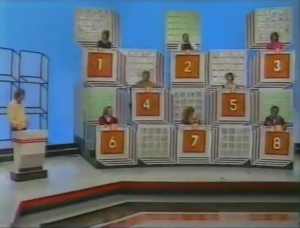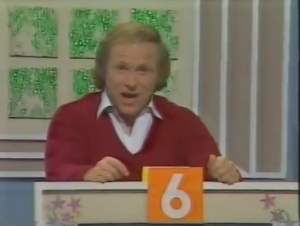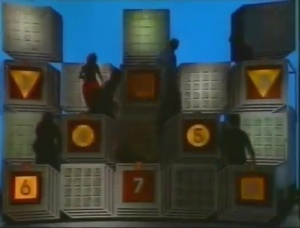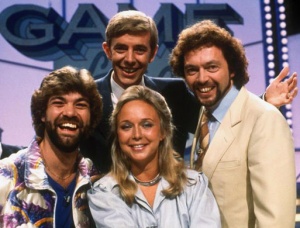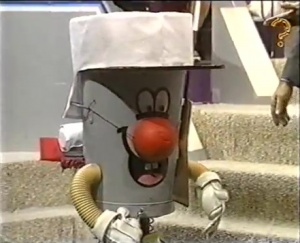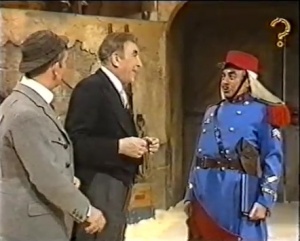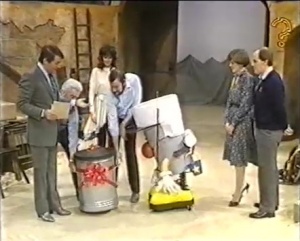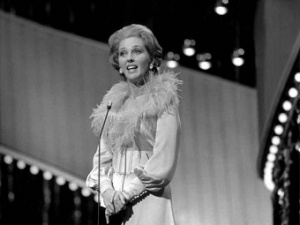Weaver's Week 2018-03-25
Last week | Weaver's Week Index | Next week
Well, this is awkward. Our original plan for this week said, "Mastermind final", but then we found the final wasn't on for another week.
Then we thought, "Saturday Night Takeaway is brilliant at the moment", but then Ant got involved in a car smash, and we're not going to write at length on that topic.
So we're scrabbling for something to write about. And then we remembered a good idea from BBC4.
Contents |
It was 35 Years Ago This Week
You've got the Top of the Pops reruns to blame for this. When the repeat run started (seven years ago!), they tried to air episodes exactly 35 years after they first went out. Other events have intervened – two presenters are deemed not fit for broadcast, a third has not granted permission for his shows to be rebroadcast, the reruns are so popular they're putting out two episodes most weeks, and "35 years ago" has turned into "about 32-and-three-quarters years ago, and falling fast".
But let's run with the idea, and look at some of the game shows we would have been watching in late March 1983.
Later in the week, Daviod Yip reads on Jackanory. This week's Top of the Pops moves to Wednesday, it features the debut of Mark Unpronounceablenameofbigcountry, and Nick Hayward misses his cue. Thursday is given over to A Song for Europe. The BBC juries will pick "I'm never giving up", a faded photocopy of Bardo, themselves 50% of Bucks Fizz.
By coincidence, we also had a Mastermind-shaped hole in 1983, the usual Sunday night slot had been usurped by the BAFTA Film and Television Awards. As a result, BBC1 has just one other game show all week: Finders Keepers (1) on Friday features Glebe School from Girton and Newton School from Porthcawl.
Pot Black continues on BBC2, with Eddie Charlton and Tony Knowles. Password and Jeopardy! are on Channel 4. On ITV, Three Little Words and Mr and Mrs go out on Tuesday, and Family Fortunes starts the weekend right.
BBC1's Saturday schedule began with The Dukes of Hazzard, some fix-its, and Paul Squire, Esq. Squire had been on New Faces a year earlier, and was judged strong enough to get a Saturday night light entertainment series. It wasn't bad, but got lost in the mixture. BBC1's Saturday had no real reason to tune in, it was just lacking sparkle. Dr Who had been moved to midweek, Match of the Day spent this season on Sunday afternoons. Early evening had been The Late Late Breakfast Show, but that first series didn't have pace or energy, it was (gasp!) boring. After the film, the late evening slot had a chat show – Sin on Saturday was a notorious flop in August, and now Wogan talked to worthy people like David Bellamy.
Over on ITV, Saturday night has its tentpoles. Metal Mickey while Dad's out getting fish and chips, Punchlines with Faith Brown and Bernie Winters when he comes back. Then it's 3-2-1 and often a movie. The football highlights are about 10pm. ITV's wiping the floor with the opposition.
So, let's look at two of these Saturday night shows.
Punchlines
LWT for ITV, 24 December 1982
Not every episode of every series is available for archive viewing. We don't have the episode from 35 years ago this week, but we do have an episode from the same series, so let's roll with it.
Lennie Bennett hosts this programme, and he's joined by eight Punchliners. For this Christmas episode, they've got impressionist Faith Brown, musician and entertainer Joe Brown, Play Away comedienne Judy Gridley, dj David Hamilton, comedians Kenny Lynch and Albert Pontefract, character actress Madeline Smith, and Generation Game co-host Isla St Clair.
The stars don't stop there, because the contestants play with famous faces. Working with Clint is Diana Dors, the leading sex symbol of the era. We don't use phrases like "sex symbol" any more. Nor do we make jokes about people's skin colour, and we certainly don't parade about in Nazi regalia on Christmas Eve, as Freddie Starr did. He's on the same team as contestant Chrissie, and adds nothing of value to the show.
The idea behind Punchlines is elegant. Here are eight punchlines, and here are seven feed lines. All you've got to do is match them up, and the better team over three rounds will win.
Let's work a round through. The punchlines were:
- Do you like dressing up as a woman?
- I'm going to give you a sex test.
- I'm so glad you agreed to marry me, darling.
- I got a red one that glows in the dark.
- I suppose a kiss is out of the question.
- It's time for your sage and onion.
- Would you like a goose for Christmas?
- You play with mine, and I'll play with yours.
The feed lines were:
- Holding the mistletoe in his hand, Edward Heath went up to Mrs. Thatcher and said...
- On Christmas morning, Bernard Matthews looked at the most bootiful turkey and said...
- After he proposed to her, Ronald Reagan smiled at Nancy and said...
- During rehearsals, Baron Hardup looked at the pantomime dame and said...
- Before the games, the doctor looked at the lady Russian shot-putter and said...
- Scratching his nose, Rudolph turned to Father Christmas and said...
- When he got bored with his Christmas presents, the little boy said to the girl next door...
Written out like this, it's easy to match the punchlines to their feed lines. But that's only part of the battle: the contestants must also remember where the punchlines were. Madeline Smith gave the first punchline from box 5; then it was up to Albert Pontefract, down to Faith Brown, and around until they're all done. So when Clint hears the feed line about Ronald Reagan, he might call "6"!
The show has engineered one form of comedy, it's built up an expectation and then subverted it. We hear a competent setup, and then we hear a completely mismatched response. In this example, it's engineered another form of comedy, the unlikely image. Ronald Reagan might be a complete dunderhead, but even he knows the difference between his wife and a turkey.
Once a feed line has been matched, it falls out of play, and the player gets 10 points for it. The remaining feed lines appear in rotation, so we'll hear them more and more often. That's another way to build up humour, repetition of a feed line, repetition of a punchline, and the two still don't meet. Until, eventually, they do meet.
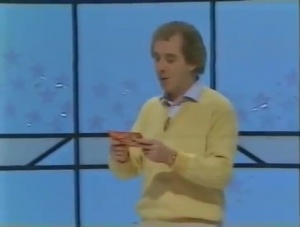 Lennie Bennett, out of his depth in the style of Nicholas Parsons.
Lennie Bennett, out of his depth in the style of Nicholas Parsons.
There's one final source of humour: Lennie's attempts to control the game. You could field a football team out of the famous people on this show: Albert Pontefract in goal, Isla St Clair as the nippy midfielder, Freddie Starr on the right wing. The large egos are encouraged to act up, and to make Lennie Bennett look a fool. He has difficulty keeping the game on track, constant interruptions from the boxes and the fool on the floor. But it's his show, and the game does progress.
Later rounds use the same idea, but make it harder. Round two gives the punchlines, then all of the Punchliners change places. The people might move, but the punchlines remain where they were. The players have to remember where the joke was, not who said it. It's the scene where lots of people move around; that was Punchlines, not Celebrity Squares.
After the commercial break, the final round is a guessing game: we go straight into the feed lines, we don't hear the punchlines first. This round's played for double points, and the first team to 150 points wins. (There are 300 points in the game, so this means the better team wins and we're sure not to have a tie.)
The civilian from the winning team goes on to play the prize game. Very brief "punchlines" – perhaps answers to a question. Again, they're given in no particular order. Lennie will read out clues, and Clint will call the star to answer it. This isn't against the clock, but has to be done at a fair clip, while the contestant's memory is still fresh. He gets 6 out of the potential 8 answers (and 7 will win the top prize).
Back to the present
The format of Punchlines was imported from the States, Eye Guess had run on NBC from 1966 to 1969. This version was produced by Alan Boyd, a legendary producer. He'd created The Generation Game as we know it, and was responsible for Blankety Blank. Edged out of the BBC for being too commercial, Alan Boyd was snapped up by LWT. He brought us The Pyramid Game, he gave us Punchlines, he was behind Blind Date, and he let us have Game for a Laugh.
Alan Boyd's shows were popular, funny, and entertaining. They didn't get good reviews from critics in the press, perhaps because press reviewers wanted to subsist on a diet of Shakespeare and gruel. The public knew what it wanted, and it wanted popular entertainment shows, preferably with plenty of celebrity.
The public still wants popular entertainment shows with plenty of celebrity. Saturday Night Takeaway is exactly that. Like Punchlines, Takeaway is made with care and attention. Like Game for a Laugh, Takeaway eats ideas at a ferocious rate. And like all of these shows, Takeaway is hugely popular, one of the most-seen shows on television. Yes, Takeaway moves at a fast pace, but neither Punchlines nor The Pyramid Game were slow-paced.
Takeaway differs from Game For a Laugh in one crucial way. The earlier show appeared to be irresponsible, it could come across as exploiting vulnerable people. Ant and Dec have survived their own exploitation scandal, fleecing people through dodgy phone-in prizes. They've come back as reformed characters who don't do sob stories, they glory in rewarding people who deserve reward. They're not endangering the public, though might endanger their own health at times.
The critics sneer at Saturday Night Takeaway because it doesn't go out on streaming service Webclix. The people ignore the critics, and make the popular popular. But Punchlines didn't win the night in 1983: let's look at the show that did.
3-2-1
Yorkshire TV for ITV, 19 March 1983
Back in 2014, we reviewed 3-2-1 in its early incarnations, shown from 1978 to 81. We're not going to reprise all of the points we made then.
Ted Rodgers still comes through the audience, still cracking jokes. "I'd go a lot more by train if I wasn't going to bump into Jimmy Savile," he says. "Me too," says the entire travelling public. By 1983, Ian Rowley had completed his work, Dusty Bin was properly animated, with arms that could move and play the trumpet.
This week's theme is "Foreign Legion". In the quiz round, the couples are asked for words beginning "SA", "RA", "HA", linking with the theme. The cash prizes are decent, the losers go away with £360 in 1983 money – that's now worth about £1000.
The main entertainment is an extended comedy sketch featuring Chris Emmett as a Foreign Legion commander, and Frankie Howerd as a tourist tricked into joining the Legion. Christopher Beeny plays his travelling companion, Dilys Watling and Danny O'Dea also appear.
There are sight jokes throughout, we start with a man operating the revolving scenery, and finish with a very loud pianist. From memory, this was an unusual episode. Most episodes had a mixture of sketch, song, dance, and other variety acts. We can believe that Frankie had said "Yes, I'll come, but I've got to be the star of the show. Appear throughout, you know."
The games to determine the winning couple had been abolished: no more fanning a YTV yacht across the floor, no more computer breakout. It was just one simple question. Highlight of the night might be the quiz question. "I am a country in North Africa". "Algeria". Right!
Or it might be the very telegraphed joke, with Frankie commenting on Christopher and Dilys's conversation.
- "Why did you join the Foreign Legion?"
- "This is it. Get ready, here we are."
- "The usual reason."
- "Wait, wait, wait."
- "I joined the Legion to forget!"
- "To forget what?"
- "All together now!"
Audience: "I've forgotten!"
Our winners will want to forget the rest of the show. The car goes first, followed by the 3-2-1 Holiday to Tunisia. Some camel hair coats and matching luggage are third to go, which leaves the bin and something nicer.
While the rest of the show has bowled along amiably, this is properly tense, Sue puts all the weight onto John's shoulders, and he chooses to reject – the stone, "if you throw it, you won't win". It's a lovely conservatory.
Which means that John and Sue win tonight's booby prize: you may have been in a cleft stick, and had you dispatched this summarily, it would have given quite a catch. Still, they do have £540, and they've had some top-notch entertainment.
This Week and Next
The death of Catherine (Katie) Boyle has been announced, aged 91. She's best known as the host of the Eurovision Song Contest in 1960, 1963, 1968, and 1974. She hosted the monthly programme Pop Over Europe for The Light Programme and Radio 2 from 1964 to 1980, supported the Battersea Dogs Home, and was the advice columnist in the Television Times. She advertised a soap, a little lovelier every day.
Catherine had impeccable European credentials: born Caterina Irene Elena Maria Imperiali de Francavilla, her grandparents were English, Australia, Russian, and Neopolitan. Schooled in England, Italy and Switzerland, raised in Tuscany, married Richard Boyle (Baron Carleton), and host of "The Beauty Spot" on the BBC's afternoon show Quite Contrary (1953-5). She was a regular on panel games in the 1950s and 1960s, both in English and Italian; she'd later grace shows like Punchlines and Blankety Blank. Katie hosted a mid-morning show on Radio 2 for some months in 1990-1, and had a weekly programme "for animal lovers of all ages" until 1995.
The death of Lys Assia, singer of the first winner of the Eurovision Song Contest in 1956; she was 94.
The death of Emma Tennant, one of the powerful people behind the scenes. Emma was the controller of digital group UKTV, the people behind Gold and Drama and W and Really and Home and many more. Her earlier career had been at UK Living, ITV2, ITV3, and CITV. Emma Tennant was 49.
Only Connect has its first quarter-final, Inquisitors versus Vikings. The Inquisitors kick off with a very long explanation of a question, it's worth one point if they ever finish it. Three on the picture clues, named after battles. Are the Vikings' chances extinct? No, they score a couple on dead birds. Inquisitors reply with three on what happened to the ashes of dead people. Don't the Vikings want to score? Sorry, "The Vikings want to score", it's number one singles prefixed by "Don't". After a high-scoring round, 7-5 to the Inquisitors.
If this is where it all ends: neither side raise a glass to absent friends, but neither did they remember music from Princess Diana's funeral earlier. The lifecycle of the Kampuchean moth (or, indeed, any butterfly) nets three for the Vikings, the Inquisitors hit two with "why – elements spelling Because". Neither side scores on pictures of men named after evangelists, nor on counties where motorways end. Vikings sound the Five Point Klaxon on a film question, but get bogged down with Jason Bourne films when they should have gone for New Moon. 9-8 to the Inquisitors, and perhaps the Vikings should have settled for two.
Perhaps that didn't matter: the Vikings achieve perfection on their wall. Perhaps it did, the Inquisitors are also perfect, and retain a 19-18 lead. Missing Vowels breaks to the Inquisitors, winning 25-23.
Emmanuel Cambridge made their mark on University Challenge, this week, suggesting that the guitar solo from "Stairway to heaven" was by Oasis. Emmanuel lost this week's match, and exit the competition. Fitzwilliam Cambridge won, 175-150, the match ended with three one-question shootouts.
BARB ratings in the week to 11 March.
- Call the Midwife the top show (BBC1, Sun, 8.3m). Saturday Night Takeaway the biggest game (ITV, Sat, 7.8m).
- Dancing on Ice had its final, and pulled 6.05m (ITV, Sun). The series has been solid for ITV – 5 million most weeks, and sometimes ahead of BBC1's massive Countryfile.
- BBC The Voice continued (ITV, Sat, 5.6m) and beat Grate Minor Celebrity Burn-Out (C4, Tue, 5.5m). Sir Bruce A Celebration enticed 4.75m to BBC1 (Sun).
- The Chase (ITV) peaked on Monday with 3.55m consolidated. Tenable sneaks into ITV's top 50, Monday's repeat took 1.125m viewers.
- Hell's Kitchen returned to ITV2 (Tue, 505,000). Yankee Top Model (UK Living, Fri, 460,000) and Portrait Artist of the Year (Artsworld, Tue, 420,000) continue to be huge. Rupaul's Drag Race All Stars hits a new peak (Comedy Central, Fri, 245,000), of whom about 1000 saw the first transmission at 2am.
Band Cymru finds the best brass / wood / jazz band (S4C, Sun). Masterchef continues all week (BBC1), Dancing With the Stars finishes (RTE1, Sun), and it's the Mastermind final (BBC2, Fri). Next Saturday has the first edition of Ready or Not (BBC1), world champions on Pointless Celebrities, the Live Semi-Final of BBC The Voice (ITV), and Saturday Night Takeaway with a surprise guest.
Photo credits: BBC, Central, LWT, YTV.
To have Weaver's Week emailed to you on publication day, receive our exclusive TV roundup of the game shows in the week ahead, and chat to other ukgameshows.com readers, sign up to our Yahoo! Group.

